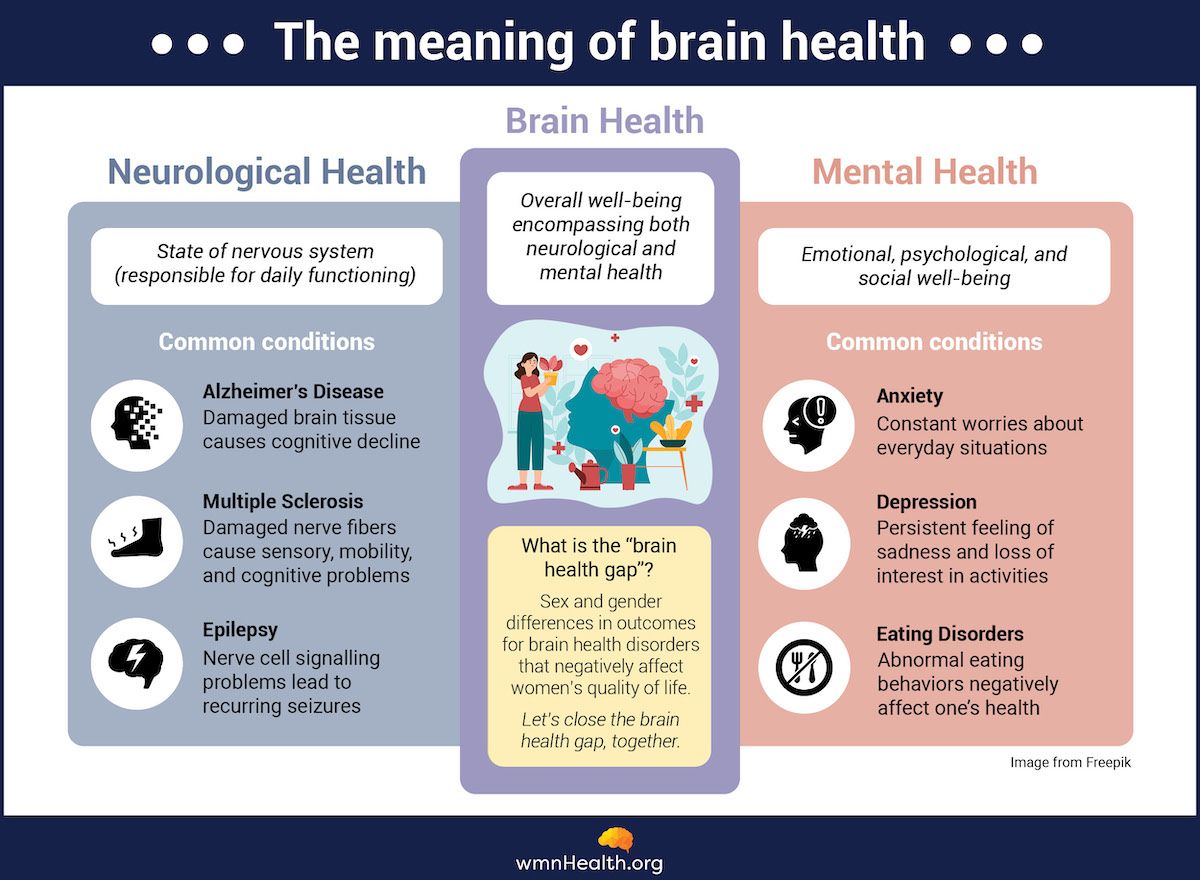
This article covers:
What do we mean by "brain health"?
Common neurological conditions in women
What's the first thing that comes to mind when you hear the term "brain health"?
I.Q.? Memory? It's not what you think.
Decades of scientific discovery tell us that brain health goes far beyond our mental powers and ability to remember. According to the World Health Organization (WHO), brain health is a state in which every individual can realize their abilities and optimize their cognitive, emotional, psychological and behavioral functioning to cope with life situations.
Brain health is a state in which every individual can realize their abilities and optimize their cognitive, emotional, psychological and behavioral functioning to cope with life situations.
This means we need to look beyond the traditional framing of brain health rooted in disorders and deficits and instead focus on skills like adaptability, creativity, and meaningful social connections that allow people to thrive.
Today, in the U.S. alone, almost 100 million people live with at least one brain condition, such as dementia, chronic pain, mood disorders, epilepsy, migraine, traumatic brain injury, or Parkinson's. Some of these conditions affect what we remember and think. Others lead to changes in how we move, our mood, or even a combination of these symptoms. And many of them — neurological conditions like Alzheimer's and mental health issues like depression and anxiety — disproportionately affect women.
The good news is that no body part is as plastic — malleable and capable of change — as the brain. The brain can generate new cells, reorganize neural pathways in response to experiences, create connections through learning, and adapt to challenges throughout our lives.
Ample evidence shows our lifestyle has a profound impact on brain health. This includes physical exercise, food and nutrition, sleep, social interaction, and stress management. This intricate relationship between lifestyle habits and brain health is a powerful tool that can help us lead fulfilling lives.
In this article, learn about the different components of brain health, which neurological and mental health conditions are prevalent among women, and resources that will give you the support you need.
 Infographic by Cat Lau. Click to enlarge.
Infographic by Cat Lau. Click to enlarge.What is neurological health?
The term "neurological" comes from neurology, a branch of medicine that deals with the nervous system. You can think of the nervous system as the body's command center — a complex network of threadlike nerves that branches out to every tissue and organ, allowing for an exchange of signals between the brain and the rest of the body.
Billions of tiny nerve cells, called neurons, carry messages along this network of nerves, guiding the way we think, feel, and act. Sensory neurons, for example, transmit signals from the eyes, nose, ears, tongue, and skin to the brain. Motor neurons, on the other hand, carry signals from the brain to muscles. This vast communication network controls all bodily functions and plays an integral role in our overall health and well-being.
However, aging, trauma, stress, or illness can degrade the nervous system. These are the most common symptoms of a neurological condition:
- Tingling or loss of sensation
- Loss of vision or double vision
- Persistent headaches
- Memory loss
- Seizures or tremors
- Language impairment (problems with expressing or comprehending thoughts)
- Lack of coordination
Common neurological conditions among women
About 1 in 3 people develop a neurological condition during their lifetime. But, the risk factors, symptoms, and progression of many of these conditions look different in women. Understanding these sex- and gender-based differences can allow women to better advocate for their health and receive timely care.
Alzheimer's disease
Twice as many women are living with Alzheimer's than men. This brain disorder leads to a progressive decline in memory, cognition, and learning when there's an abnormal buildup of proteins inside and around brain cells. The damaged cells die off, and the brain shrinks.
For decades, experts have attributed disproportionately higher rates of dementia in women to age. The latest research shows gender inequality is also a major risk factor for women.
🧠 Hear from experts what that means and how you can lower your risk.
Attention-deficit/hyperactivity disorder (ADHD)
Women with ADHD are more likely to report a history of depression and anxiety. This chronic neurological condition is characterized by imbalances in the function and structure of nerve cell networks responsible for relaying signals to and from the brain and the body.
Epilepsy
Many women with epilepsy have more seizures before or during their menstrual period. This is because hormones affect seizure frequency in about 30 percent of women with the condition.
This neurological condition is caused by uncontrolled bursts of electric activity in the brain.
🧠 Learn about the symptoms and causes of epilepsy and how to live a fulfilling life with it.
Migraines
Twenty percent of women experience migraines, which leads to throbbing pain on one side of the head. This type of acute pain is caused by a wave of activity by groups of excited brain cells called neurons. This triggers the release of chemicals like serotonin that narrow blood vessels.
Changes in the female sex hormone estrogen is a risk factor for migraines in women.
🧠 Learn more from a panel of experts here.
Multiple Sclerosis (MS)
Women are three times more likely than men to be diagnosed with MS. This chronic neurological condition affects the brain, the spinal cord, and optical nerves when the coating the protects nerve fibers, called myelin, gets damaged.
This can lead to blurred vision, brain fog, depression, and challenges with movement and coordination.
🧠 Learn more about the science of MS and its overlooked symptoms in women.
Parkinson's disease
Millions of women worldwide are affected by Parkinson's. Yet, research has predominantly focused on men, and experts are still learning how the condition manifests in women.
This progressive neurological condition is caused by the degeneration of nerve cells in the part of the brain that controls movement. When these nerve cells are unable to produce dopamine, it can result in tremors, rigidity in muscles, and challenges with movement and coordination.
🧠 Learn more about the science of Parkinson's, its symptoms in women, and how to live with the condition.
What is mental health?
Just like neurological health, mental health is an equally important part of brain health and has a significant impact on women's quality of life.
According to the U.S. Centers for Disease Control and Prevention (CDC), mental health includes emotional, psychological, and social well-being. It also helps determine how we handle stress, make healthy choices, maintain good physical health, and develop meaningful relationships with others in our community.
Although good mental health often implies the absence of mental illness, mental health exists on a continuum that varies from one person to the next. This means people with mental illness can also experience periods of emotional, psychological, and social well-being. Likewise, a person without a mental illness can undergo life circumstances like working long hours or caregiving for a family member that could result in them experiencing a period of poor mental health. When that happens, these areas of the brain are most affected:
The amygdala is a small almond-shaped structure at the base of the brain, which is responsible for processing emotions, helping with memory storage, and kicking in the "fight-or-flight" response. Studies have shown the amygdala can become hyperactive in stress-related mental health conditions, such as anxiety, depression, and post-traumatic stress disorder (PTSD).
The hippocampus is a region of the brain associated with learning and memory formation. It tends to shrink in instances of mental health conditions, and this loss of volume has functional implications like inability to concentrate and poor memory.
The prefrontal cortex is the brain's "personality center" that integrates environmental stimuli and past experiences. Shrinkage of the prefrontal cortex causes loss of initiative, apathy, and behavior changes.
These changes in the brain are linked with the following symptoms of poor mental health:
- Problems with sleep
- Persistent feelings of sadness or irritability
- Changes in appetite
- Changes in behavior
- Inability to concentrate
- Social withdrawal
- Persistent headaches
- Sensations of a tightened chest or racing heart
- Digestive problems
Common mental health conditions among women
About 1 in 5 women in the U.S. experience a mental health condition, which is three times higher than men. Biological differences between males and females, including the influence of sex hormones, are at play. But, social and economic disparities, such as sexism, racism, and unequal opportunities, create unique barriers for women that increase their likelihood of experiencing emotional, psychological, and financial hardship and decrease access to appropriate healthcare.
Anxiety
Women are twice as likely than men to develop an anxiety disorder during their lifetime. This mental health condition is characterized by high levels of the stress hormone that kicks in the body's fight-or-flight response.
🧠 Take a deeper dive into the causes and symptoms of anxiety disorders in women, and learn about the surprising link between racism and anxiety.
Depression
Women are twice as likely than men to experience depression during their lifetime. This mood disorder is linked with the amygdala becoming hyperactive, and the hippocampus and the prefrontal cortex shrinking.
These brain changes can lead to persistent feelings of sadness, loss of sleep and appetite, and changes in behavior and self-esteem.
🧠 If you or a loved one is experiencing these symptoms and have limited access to a psychiatrist, learn how to use an online screening tool and pick a mental health app that will allow you to get help faster.
Eating disorders
A shocking 65 percent of women between the ages of 25 to 65 have disordered eating behaviors. These disorders alter the brain's reward response process, which reinforces behaviors like binge eating or undereating.
🧠 Learn about the signs and symptoms of binge eating disorder in women, and why eating disorders in midlife are more common that you think.
Insomnia
Women are twice as likely as men to say that they rarely or never wake up feeling well-rested. This underscores women's experience with insomnia, a sleep disorder that is linked with dysregulation of the body's sleep and wake mechanisms.
🧠 Learn about the impact of insomnia on women's overall health and how to get better sleep at every age.
Post-traumatic stress disorder (PTSD)
Women experience PTSD at two to three times the rate than men. This psychological condition is characterized by a hyperactive amygdala that keeps the brain in a constant state of high alert.
🧠 Learn how racial trauma mimics symptoms of PTSD and how to heal from it.
A word from wmnHealth
Women's brain health is still understudied and underfunded. Still, whether it's research, technology, advocacy or policy, women are leading the charge to move the needle in the right direction. The best way to celebrate their efforts is to stay informed about your brain health and learn to put it first.


